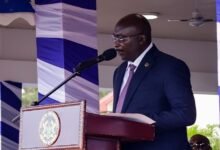
The Minority Caucus in Parliament has called on the government to indefinitely suspend the debt exchange programme and broadly consult stakeholders.
Caucus leader, Haruna Iddrisu, told journalists in Accra yesterday that it was in the interest of the government to consult wider and get the programme over the line if it was to secure an IMF bailout.
The government was forced to suspend the programme which was scheduled to commence yesterday for the second time to January 31, having faced opposition from individual bondholders.
According to a tweet by the verified account of the office of the Finance Minister, the suspension is to enable the ministry consult more.
“Building consensus is key to a successful economic recovery for Ghana,” the tweet said.
But the minority said the January 31 deadline was not realistic.
“Instead of telling Ghanaians that they have suspended the programme, they are announcing a second extension to January 31, 2023.
“They should suspend it, thoroughly consult and engage, call an economic forum, bring together heads and experts in economic management” to explore the best possible ways to get the debt programme, a condition precedent to get the IMF bailout, underway.
To Haruna Iddrisu, the ramifications of Ghana not securing an IMF bailout programme was costly for which the government must get the buy-in of all those who matter.
“The consequences ahead of Ghana is dire should Ghana fail to get the executive approval of the IMF between April and June.
“Where we sit as a minority, contingent on a plausible failure of this debt exchange programme, the IMF may not happen,” the Tamale South MP predicted.
He said the government’s decision to include individual bondholders in the exchange programme was “wicked” and could leave many poor families impoverished.
“The inclusion of individual bondholders in the DDE is the biggest transfer of funds from the pockets of Ghanaians to the government and will leave affected persons, mainly the middle class, impoverished while worsening the plight of the poor. This must immediately be stopped.”
He said though the government had preached austerity, its policy and spending decisions did not support same.
“For instance, the 2023 budget projects a primary surplus of only one per cent which means that we will be reducing the public debt by only one per cent of GDP this year,” Mr Iddrisu observed.
To him, this means that not enough expenditure cuts were being made by the government at a time it is “almost forcibly asking bondholders to forfeit interests and principal payment due them.”
“We demand further demonstration of responsibility from government through more substantial cuts in non-essential expenditure and a reduction in the humongous size of government,” he said.
BY JULIUS YAO PETETSI






